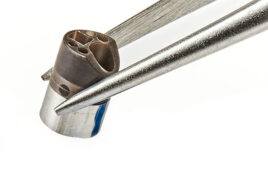A team from MIT’s Computer Science and Artificial Intelligence Laboratory (CSAIL) and Massachusetts General Hospital (MGH) have used machine learning to better understand muscle tension dysphonia (MTD).
MTD is a behaviorally-based voice disorder, one where patients experience deteriorating voice quality and vocal fatigue—otherwise known as “tired voice”—which is difficult to diagnosis due to the lack of any clear vocal cord damage or other medical problems.
Researchers used accelerometer data collected from a wearable device developed internally to detect differences between those with MDT and matched controls. The same methods also showed that, after getting voice therapy, MTD subjects had behavior similar to that of the controls.
Using machine learning proved to be a challenge for the group, as existing approaches to using the method for physiological signals involved supervised learning, a time-consuming affair that involved labeling data painstakingly and providing desired outcomes. Instead, the group used unsupervised learning, where data is unlabeled at the instance level.
The study was broken into two groups: those that have been diagnosed with voice disorders and a control group of people without disorders. Each group went about daily activities while wearing accelerometers on their necks that captured the motions of their vocal folds.
Once the researchers looked at the groups’ data, analyzing more than 110 million “glottal pulses” that each represent one opening and closing of the vocal folds, they could detect significant differences between the participants of each group.
The researchers also found that after voice therapy, the distribution of patients’ global pulses were similar to the controls. According to MIT professor John Guttag, this is the first study to use machine learning to provide objective evidence of the positive effects of voice therapy.
A goal of this work for the research team is to use the data not just to improve the lives of those with voice disorders, but to help diagnose specific disorders. They also hope to further explore the reason why certain vocal pulses are more common in those with voice disorders than the ones in the control group.




